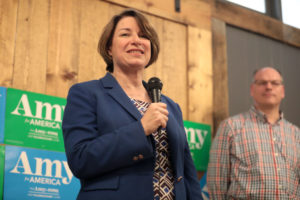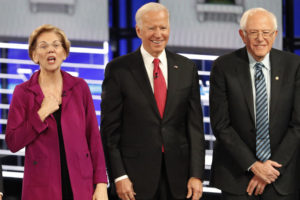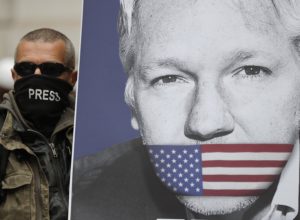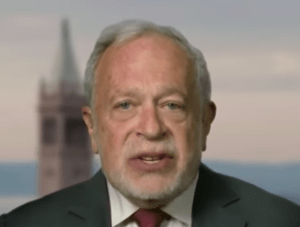The 2000 Election All Over Again
If we seemed doomed to refight the battles from eight years ago, perhaps it's because Al Gore's warnings about a Bush presidency turned out to be so prescient.WASHINGTON — “Powerful forces and powerful interests stand in your way,” the candidate said, “and the odds seem stacked against you — even as you do what’s right for you and your family.”
He would fight these powers, and take on in particular “big tobacco, big oil, the big polluters, the pharmaceutical companies, the HMOs.” Sometimes, the candidate declared, “you have to be willing to stand up and say no — so families can have a better life.”
John Edwards, 2008? No. Al Gore, 2000.
The campaign trail is ablaze now with fiery populism, with just about every Democrat — and Edwards in particular — railing against the forces they say have eroded the economic well-being of the middle class, diminished Americans’ access to health care and threatened the roofs over their heads as the subprime mortgage crisis is transformed into a foreclosure calamity and credit crunch. Even Republican Mike Huckabee, breaking from his party’s orthodoxy that there’s nothing really wrong with the economy, has been chanting the populist mantra, to the chagrin of the party’s pro-business wing.
Has something changed since Gore delivered his populist manifesto during his acceptance speech at the Democratic National Convention in Los Angeles — and was ridiculed by much of the political class and the media as a phony making a fraudulent argument?
Well, yes. Much of what Gore warned would happen if George W. Bush won the presidency has come to pass.
The Republican president did try to privatize Social Security and carve out private accounts from the government-guaranteed benefit. “Social Security minus,” Gore called it then. The Republican president and a Republican Congress did, indeed, pass a Medicare prescription drug benefit that “tells seniors to beg the HMOs and insurance companies for prescription drug coverage,” just as Gore predicted in his speech.
“Big tobacco” turned out to be one of the biggest winners of the past legislative session, even with Democrats in control of Congress. The White House and a core group of House Republicans refused to go along with hiking tobacco taxes to pay for an expansion of health insurance for needy children. That was even after Democrats stripped out a proposal to pay for the kids’ insurance by reducing billions in subsidies the Republican Congress had lavished on the managed-care industry.
As for “big oil,” who needs more than a visit to the gas station? With the price of oil reaching $100 a barrel, and industry profits already having set records in 2006, does anyone wonder what kind of year “big oil” will turn out to have enjoyed when it posts profits for 2007?
Gore could not have foretold the stagnation in wages that has been the dominant, if little discussed, economic trend of the past seven years. With the focus on HMO outrages during the 1990s, the former vice president can be forgiven for not having predicted a worse development: the number of Americans without any health insurance has grown by 8.6 million since 2000.
Middle-class concern about the economy has deepened since then, as jobs and pensions have become less secure. The anchor of middle-class life — homeownership — now seems threatened. Unease that was buried beneath the rubble from the terrorist attacks of 9/11 and obscured by the bloodshed in Iraq has become a full-blown fear of falling backward.
Still, the anointed commentariat is likely to dismiss the populism that rises up from the campaign trail as lacking substance, political staying power, or both. Among those who sneered at Gore were Peggy Noonan, William Safire, George Will, Michael Barone and various other pundits who, while sometimes giving the vice president points for delivery, declared his us-against-them speech to be a sure-fire turnoff.
After the campaign, Gore’s running mate, Joe Lieberman, said populism was “ineffective” and that Americans reject “us-versus-them” rhetoric. But the populist Gore, whose support surged after the convention, managed to win the popular vote. Lieberman now supports Republican John McCain for president.
There’s no mystery about what will happen in 2008 once the nominees are known. Some sort of economic populism will remain central to the Democrats’ message — otherwise they’d be guilty of political malpractice. Republicans will decry this as “class warfare” and hew closely to the Bush economic prescriptions of tax cuts for the well-off and willful blindness to other economic pressures burdening families.
So we are doomed to go back to the future, facing much the same choice we did in 2000.
Marie Cocco’s e-mail address is mariecocco(at)washpost.com.
© 2008, Washington Post Writers Group
Your support matters…Independent journalism is under threat and overshadowed by heavily funded mainstream media.
You can help level the playing field. Become a member.
Your tax-deductible contribution keeps us digging beneath the headlines to give you thought-provoking, investigative reporting and analysis that unearths what's really happening- without compromise.
Give today to support our courageous, independent journalists.






You need to be a supporter to comment.
There are currently no responses to this article.
Be the first to respond.